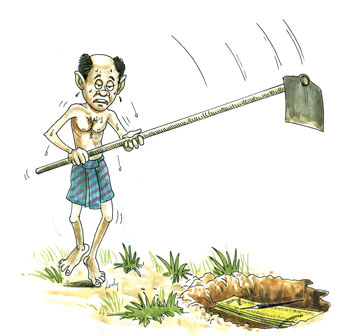Digging for a knowledge fountain

“What is your source of knowledge?” Asked one of my closest elders.
That left me baffled – flabbergasted, if I give away my feelings.
“Novel…” I answered and felt it was something too quick. So I let the
words hover around a little, and then I finished off my response.
“And poetry.”
Well, it is not only novel and poetry that inspire or lighten up my
soul. But the book I am reading these days, John Banville’s ‘The Sea’ –
the 2005 Man Booker Prize winner – seems to fit my response. It is a
novel written in a poetry style. You hardly find a story, because every
single incident is spelled out in fullest maximum length. When Daily
Telegraph quotes the work as Banville’s best novel so far and ‘they are
like hits of some delicious drug, these sentences’, I think I have to
have my hats off.
If we are to talk straight, then let me say we all hunt for a story
in a novel – be it detective, horror or romance. Very rarely do we take
a break to breathe in the writing style’s beauty. But in poetry that is
difficult. Everyone cannot read poetry – I mean those who are sort of
addicted only to detective stories - because it needs patience. There is
no story at times. You have to read and sometimes reread the same line a
few times to either understand or enjoy.
 Anyway…
At the bedtime I was wondering about that ‘knowledge source’ question.
For me it seems a straight translation of Sinhala gnana moola or gnana
ulpath (knowledge fountains). I have hardly or perhaps never seen this
word called knowledge source or knowledge fountain in English. Hang on…
I don’t mean to say this is not in English literature. It might be
there, just that I haven’t heard or seen it. Anyway…
At the bedtime I was wondering about that ‘knowledge source’ question.
For me it seems a straight translation of Sinhala gnana moola or gnana
ulpath (knowledge fountains). I have hardly or perhaps never seen this
word called knowledge source or knowledge fountain in English. Hang on…
I don’t mean to say this is not in English literature. It might be
there, just that I haven’t heard or seen it.
Whatever it is, this word seems fascinating. It betokens the legacy
of both orient and occident. I always believed being influenced by both
these streams. We don’t have to leave aside the occident just because we
belong to the orient. Come on… occident is beautiful too. Shouldn’t it
have its way too?
Whenever an author climbs up the ladder of my favourite list, I do a
little research on him/her. That includes their favourite books and the
ones they recommend. I have found many modern writers being fond of
modern works. Very rarely do I find them making reference to old
classics as their knowledge fountain. I simply don’t know why.
I remember one undergraduate raising a question in a discussion
forum: do we really have to read ancient classics to sharpen our reading
and writing skills? The answer was a vague and ambiguous yes. Not only
that, he pointed another interesting fact. That we have hardly got time
to dwell on old classics because there is so much to read in modern
literature.
Fairly true, I think. We have passed the W. A. Silva period long long
time ago. Novelists were only a handful by then. Publishing and printing
were not so easy as it is now. But things are different now. Even more
than poetry, short story collection or any other heavy stuff like
biography, novels are becoming a haystack, especially in English. Almost
every novel I come across has a label to say it is the bestseller. If
all these are bestsellers, I wonder what is the ‘bestest’, or the best
of the bestsellers.
So where are we heading now? We started with knowledge sources and
now our talk is on novels. Don’t you think we are nowhere? Well, I don’t
think so.
This ‘haystack’ issue poses a challenge to readers, writers and
students. They have quite a lot to read and study. Remember I once
mentioned in these columns that we should derive our inspiration from
ancient classics – I still stick to that policy. But it seems
impractical because of two reasons. First many modern writers recommend
contemporary works. Second ancient classics take time which we should
have used for another modern work.
Now that leaves you in a dilemma. To do or not to do read ancient
classics? If you are a speed reader then I think you have a fair chance
to read both categories. And remember you can’t use the whole ancient
language, unless you train your mind to manipulate them.
Will that be a knowledge source or knowledge fountain? And by the way
what is your knowledge source?
To you, my dear perceptive reader, I bequeath this question!
[email protected]
|



